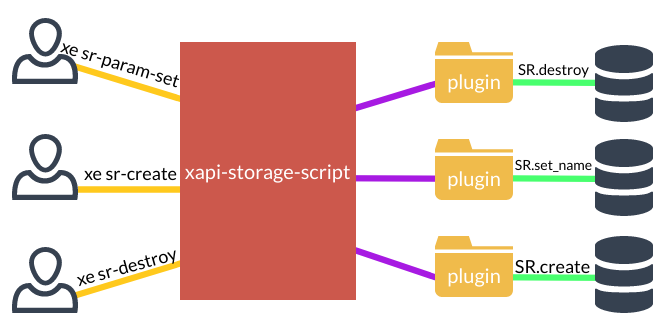XCP-ng DevBlog - SMAPIv3
The current storage interface protocol used in XCP-ng is an old protocol named SMAPIv1, and it hasn't been improved for some time. While being a very solid solution, it certainly lacks a lot of support for plugins, and has a lot of headroom for more performance.
However on the developers side, SMAPIv1 also lacks documentation and is difficult to maintain and improve. More importantly, adding new plugins is a lot of work that requires knowledge in tapdisk and blkback among other things. In short, working with SMAPIv1 is a pain and doesn't seem to be a suitable solution in the long term.
SMAPIv3 is a new and interesting alternative to creating new plugins without a deep knowledge of the storage.
What is SMAPIv3?
SMAPIv3 is a storage interface protocol that provides an easy way to connect the Xen API (xapi) to any storage type. It is also an Open Source API initially developed by Citrix for its hypervisor (Citrix hypervisor aka Xenserver). However even though the API itself is Open Source, the implementation by Citrix is not, therefore we decided to fork the initial project to create: xcp-ng-xapi-storage.
SMAPIv3 features and fork
The initial fork of the storage interface protocol contains libs, plugins and daemons. Currently, the original SMAPIv3 supports:
- Storage Repositories: VDI collection from the same location.
- VDIs may be created, cloned, snapshotted, queried, attached and detached from VMs. This stack is recent, so some features are missing and will be implemented in the future to get the same level of functionality as SMAPIv1.
- Plugins are automatically loaded when they are added in specific folders monitored by a service:
xapi-storage-script. It's an open source component created by Citrix. - The plugins expose capabilities and these are reported via the Xen API.
- Good log integration (/var/log/SMlog).
- Plugins separated into two types:
VolumeandDatapath.Datapathplugins are in the more complicated category, a good knowledge of Xen is required. It's the link between the storage format (like raw device, VHD, Qcow2...) and the VM. Two plugins like this exist:qdiskandtapdisk, they are not used directly by developers to simplify the creation ofVolumeplugins.Volumeplugins exist to directly access the physical storage.
For example afilebasedplugin provides access to a folder to store VDIs, a file URI is given to this plugin to manage the folder. In other words: The URI encodes a method to access the disk data. I/O is the job ofDatapathplugin, aVolumeplugin is just a key to access the physical storage. Currently we have 3 plugins in this category:filebased,nfsandext4.

For more info, you can take a look at this original draft: https://xapi-project.github.io/xapi-storage
What we are currently working on
Currently we are working on three important aspects:
- Make live migration possible in SMAPIv3, as it's currently not working. It's a top priority issue we are working on.
- Improve the ecosystem by supporting new volume plugins. For example, we did so for
ext4. - We are fixing various bugs and issues that have existed since the original SMAPIv3 project (eg. we already fixed the
SR.set_nameandSR.set_descriptionimplementation of plugins and other small issues). We also simplified the code for thefilebased/nfsplugins.
For the future
- Currently, we have noticed some issues in SMAPIv3's overall performance. This will require some work on other components (such as
qemu-dp). This is something we are planning to work on in the future. - In a more general way, we want to work on the improvement of the SMAPIv3 ecosystem which means creating integration between SMAPIv3 and other tools (eg. export on the fly using
xcp-ng-vdi-streamto avoid using NBD to export qcow2 images)
How to test SMAPIv3
⚠ The SMAPIv3 plugin is experimental, don't use it in a production environment.
If you want to contribute to the project, it's now possible to deploy the SMAPIv3 package in XCP-ng for testing.
Installation process
Use these commands to install the package:
yum install xcp-ng-xapi-storage --enablerepo=xcp-ng-testing
systemctl start qemuback.service
For issues, please read this page: https://github.com/xcp-ng/xcp-ng-xapi-storage#issues-and-solutions
Feedback & bug reports
Use this dedicated forum thread to discuss the experimental SMAPIv3 plugin.




